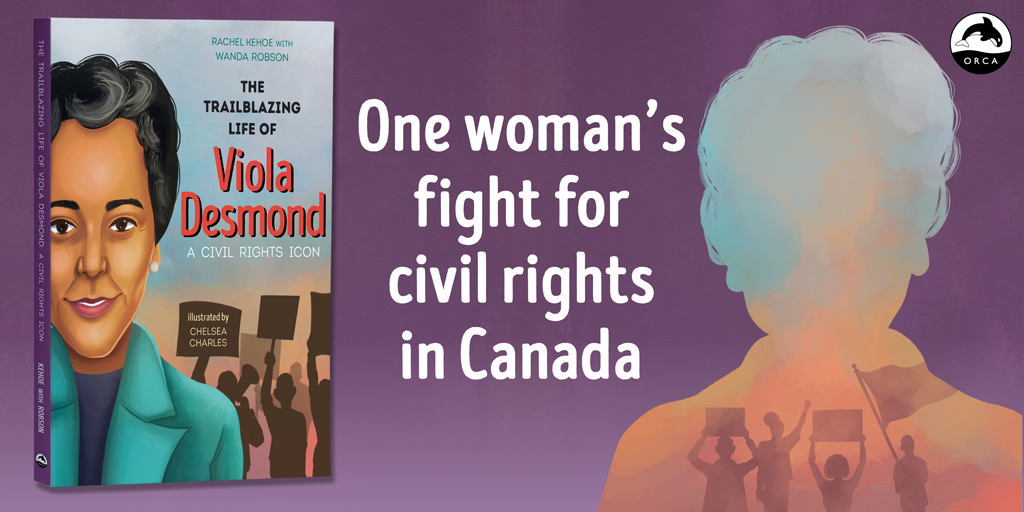On November 8, 1946, Viola Desmond was arrested for refusing to move from the “whites-only” section of a movie theater. Her heroic act inspired Black community leaders and made her a symbol of courage in the fight against inequality.
From author Rachel Kehoe and illustrator Chelsea Charles, The Trailblazing Life of Viola Desmond is an illustrated nonfiction book for middle-grade readers that tells the story of Viola Desmond’s life, based on interviews with her sister Wanda Robson. Find out what inspired Rachel to write about Viola’s life and what she hopes readers will take away from her story.
What initially drew you to Viola Desmond’s story, and how did you become interested in sharing her remarkable life with young readers?
It’s funny how everyday things can spark an adventure. I was flipping through my wallet one day, and there she was, Viola Desmond, staring right back at me. It made me wonder, who is this amazing person to earn a spot on our currency? As I delved into her history, I discovered a journey marked by determination and a woman who wasn’t afraid to challenge those who dared to demean her. It surprised me that her incredible story wasn’t more well-known. Here’s this Canadian hero who took a stand against unfairness and racial prejudice, yet so many young readers haven’t heard about her. I became determined to change that.
Wanda Robson’s involvement in championing her sister’s legacy is a significant aspect of the book. Can you share a bit about your collaboration with Wanda and the insights she provided to shape the narrative?
Connecting with Wanda was a genuine privilege and an invaluable part of my writing process. She was incredibly generous with her time, sharing family memories and stories to give a deeper understanding of Viola’s life. Even when some memories seemed distant, she’d suddenly share the most vivid stories that brought their family life into sharp focus. Through Wanda, I came to know Viola not just as an icon, but as a real person with hopes, struggles, and a deep love for her family. It’s an honour to have been trusted with these stories. I deeply miss Wanda’s vibrant spirit and the warmth she brought to every conversation.
Were there any specific anecdotes or details that you learned from Wanda Robson that deeply impacted your portrayal of Viola Desmond in the book?
Wanda gave me so many insights into Viola that really opened my eyes. One thing that really stuck with me was how Viola always took care of her sisters, showing just how important family was to her. Viola also strongly believed in the power of education. She liked to set big goals for herself and saw learning as a key to self-improvement. Wanda often spoke of Viola’s drive, her commitment to continuous learning, taking courses and challenging her limits. It’s amazing to think that in Viola’s time, many people, especially women of colour, had a hard time getting a good education. But she never let that stop her. After Viola’s passing, Wanda discovered that Viola had set aside money for the education of her nieces and nephews. To Viola, the journey of learning had no end. She saw education as a way to lift herself up and help others too. In the book, I really wanted to emphasize this aspect, revealing Viola’s drive to create opportunities, as a reflection of her enduring spirit.
Viola’s passion for Black beauty culture is a lesser-known part of her story. How did you showcase this aspect, and why is it important for readers to understand this facet of her legacy?
Viola’s dedication to Black beauty culture was truly something special. During her time, there were hardly any places for Black women to get their hair done. But Viola changed that by becoming one of Canada’s first Black women to open such a business. She always aimed high, continuously learning and taking courses to be the best in her field. But she didn’t stop there. Realizing the lack of training opportunities for Black women, Viola opened her own school, the Desmond School for Beauty Culture. She wanted to empower other Black women, giving them the skills they needed to start their own businesses and support their communities. By emphasizing this part of Viola’s legacy in the book, I aimed to highlight not just her personal achievements but the profound ripple effect of her actions. Many graduates from the Desmond School of Beauty Culture established their own thriving businesses, significantly expanding the Black beauty industry in Canada. Ultimately, Viola’s initiative paved the way for greater equality in the beauty sector, creating an environment where Black beauty was celebrated.
What message or takeaway do you hope readers will gain from reading The Trailblazing Life of Viola Desmond?
At its heart, Viola’s story demonstrates the incredible power of perseverance and conviction. I hope readers walk away with the belief that one person, equipped with determination and a sense of what’s right, can truly make a difference. And that they, too, can bring about change, no matter the odds.
What’s next for you? Any upcoming projects in the works?
Yes! I’m currently researching my next book about the fascinating world of codes. While it touches on historical codebreaking and code making, it also delves into the coding within our DNA, and how computers and AI interact with codes.

Rachel Kehoe is a freelance writer who has lived in Australia, Europe and Hong Kong. She writes regularly for the magazines Muse and Faces. She has also published science articles for Science News for Students and has written several nonfiction books on subjects such as cutting-edge technology, climate change and mental-health awareness.

